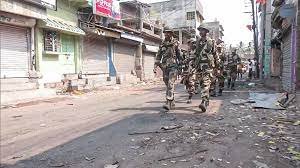Tripura’s intelligence chief arrived in Kailashahar on Tuesday to assess the security situation following violent clashes that broke out during a protest against the Waqf Amendment Bill. The protest, which began as a peaceful demonstration, quickly escalated into chaos, prompting immediate intervention from local law enforcement. The violence left several people, including police officers and protesters, injured and led to the arrest of at least eight individuals.
Officials said the intelligence chief held a series of closed-door meetings with senior police officers, district administration officials, and local intelligence units. These meetings aimed to evaluate what triggered the unrest and to develop a strategy to prevent further disturbances. The intelligence chief also visited key locations where the clashes occurred and interacted with ground-level officers to gather firsthand accounts.
Authorities stated that the protest gained momentum early in the day when hundreds of demonstrators gathered in the central part of Kailashahar. Many protesters demanded the withdrawal of the Waqf Amendment Bill, arguing that the legislation undermines religious institutions and threatens minority rights. As the crowd swelled, a group reportedly broke away and began hurling stones at the police, forcing the security forces to use mild force to disperse them.
Police officers formed barricades and tried to contain the crowd, but the situation spiraled out of control as more protesters joined the fray. Officials deployed additional forces to the scene, including units from nearby police stations, to manage the crisis. Tear gas shells were fired to bring the situation under control. The sudden violence stunned residents, many of whom remained indoors as a precaution.
The intelligence chief expressed concern over the scale and intensity of the violence, especially considering the communal sensitivity surrounding the Waqf Amendment Bill. He stressed the need for constant surveillance and prompt intelligence gathering to ensure timely alerts for any future protests. Local officials have also been instructed to engage with community leaders and religious organizations to restore calm and encourage dialogue.
The administration has begun identifying key instigators of the violence using CCTV footage and eyewitness accounts. Police officials confirmed that eight people have been arrested so far and that more detentions may follow as investigations continue. Some of those arrested have a history of involvement in political activism and public demonstrations.
In the aftermath of the incident, shops and markets in several parts of Kailashahar remained closed. Security personnel conducted patrols across the town to reassure residents and prevent the possibility of retaliatory actions or further unrest. The district administration issued an appeal for peace, urging citizens not to fall prey to rumors or inflammatory messages circulating on social media.
Chief Minister Dr. Manik Saha condemned the violence and directed senior officials to take stringent action against those responsible. He reaffirmed the government’s commitment to protecting both the rights of citizens and the law and order of the state. The Chief Minister emphasized that while democratic protest is a right, any attempt to incite violence or communal unrest will be dealt with firmly.
Local leaders across party lines also voiced their opinions on the incident. While opposition leaders blamed the government’s failure to engage with minority communities on sensitive issues, ruling party representatives defended the administration’s response and accused certain groups of deliberately creating chaos.
The intelligence chief, before departing Kailashahar, assured that his department would remain on high alert in the coming weeks. He said the region would see enhanced security arrangements, especially around religious places and public gatherings. Coordination among various agencies will continue as they attempt to assess the long-term implications of the protest and ensure peace across Tripura.
The incident has sparked fresh debate over the Waqf Amendment Bill and its reception among minority communities in the region. Civil society groups have called for more transparent communication from the government to address fears and misunderstandings. As Kailashahar returns to a tentative normal, the administration remains vigilant, aware that the recent violence could be a sign of deeper tensions yet to be fully addressed.




